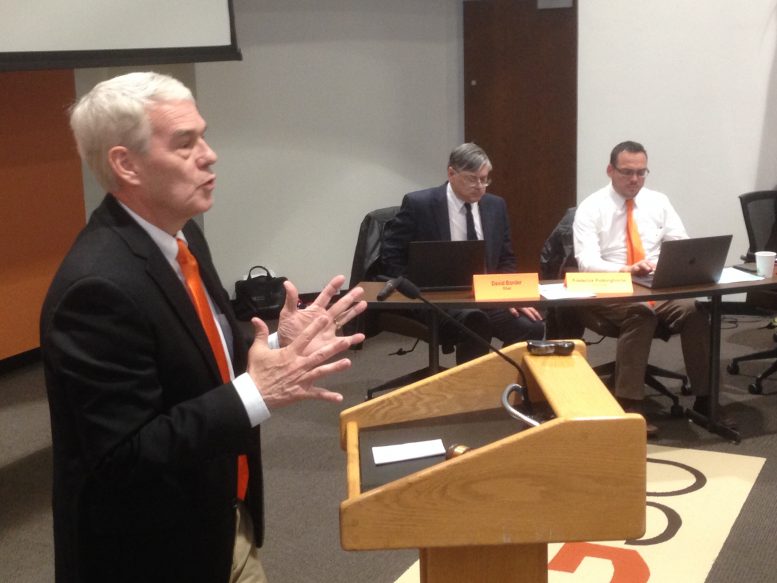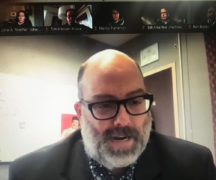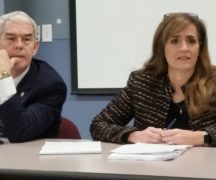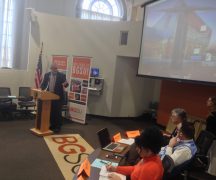By DAVID DUPONT
BG Independent News
Ohio should increase its support for higher education, State Senator Randy Gardner (R-Bowling Green) told Faculty Senate at Bowling Green State University Tuesday.
No one knows the difficulties of doing that more than Gardner, the Senate Majority Leader.
“I think if we had the same level of education achievement in this state as the national average, we’d increase our tax revenues and productivity,” he said. “We need to invest more on higher education. Ohio has not kept up.”
That came in response to a question from Megan Rancier, a senator from the College of Musical Arts, about his view of the possibility of greater state support for higher education.
In a nod to the sensitivity of the issue, Gardner told the reporter in the chamber before answering that he hoped his pen had run out of ink.
Gardner said that he wasn’t hopeful that more state share of instruction funding will be forthcoming because the state has given universities a way to raise more tuition through the freshman guarantee. Under this approach, which BGSU has adopted starting this fall, a university can raise tuition and fees for incoming students, but then those costs, including tuition, room and board, mandatory fees, and out-of-state surcharge fees, will be frozen for the student’s four years on campus.
Gardner said he would have liked to have included some additional state support, so that the incentive for adopting the freeze would not simply be financial.
Gardner said that Ohio has had the slowest growth in tuition in the nation over the past decade. Looking back to 2007, Ohio’s tuition was 150 percent of the national average. Now is closer, but still higher, than the national average, he said.
Some efforts to reduce costs may be counterproductive
“If we simply mandate lower costs without state support, it makes it more difficult to offer the same level and variety of courses and flexibility,” he said. That can mean a student not being able to schedule a course needed for graduation.
“Some of these efforts actually work against students completing their undergraduate education in a timely manner.”
If that student has to enroll for an additional semester, that will “practically” negate the savings from the tuition freeze and other cost saving measures.
One element of the cost of higher education that’s been much discussed at the state level has been the affordability of textbooks. BGSU is considered a leader on controlling those costs.
In one effort to address the issue, the Faculty Senate approved a resolution supporting elimination of the sales tax on books.
Gardner indicated he wasn’t willing to support that yet.
He said the proposal is getting pushback from localities that would lose money if the tax was eliminated. “There’s debate about whether that would be the best approach,” he said. “It’s a little more complicated than just looking at reducing the cost of textbooks.”
Gardner said that some people in the state are losing sight of the value of higher education. All one has to do is search online to find data showing that getting a bachelor’s degree or higher correlates with higher incomes and better employment prospects.
Not only does that translate into a better quality of life, but also increased tax revenues. “You don’t hear that message anymore, and we need to,” he said.
“I’m someone who believes Ohio needs an all of the above strategy” when it comes to education and job training. That means training in the trades and apprenticeships but also higher education, he said.
Gardner said he does not support provisions in House Bill 512 that would create a “mega agency” through the merger of the departments of education and higher education and the governor’s Office of Workforce Transformation.
There’s enough work to do in all those areas to justify maintaining separate departments. “Don’t worry about that one too much.”
He did say that a study of higher education’s “undergraduate mission” as called for in HB 66 could be worthwhile as long as it includes faculty, as it now does.
Gardner said many issues are best resolved on the local level. That includes whether to have post tenure reviews for professors.
A provision mandating that was still in the budget bill late in the process this year. Because of his discussions with BGSU faculty including faculty union president David Jackson, Gardner was aware this was of great concern.
But he wasn’t in Columbus during the final negotiations. Instead he participated in a conference call while accompanying his wife to the hospital for minor medical procedure.
He said this kind of behavior may cost him votes, he quipped. “But then I may not run again.”
He ended up getting the provision removed.
He noted that the capital budget recently delivered $20 million to BGSU projects on both the Bowling Green and Firelands campuses. Those will go toward a number of projects involving collaboration with the community.
That reaffirms, BGSU President Rodney Rogers, the importance of public universities. This was the most BGSU has received in a number of years.
The largest amount, $16 million, will fund the renovation of the building that houses the College of Architecture, and Applied Engineering.





